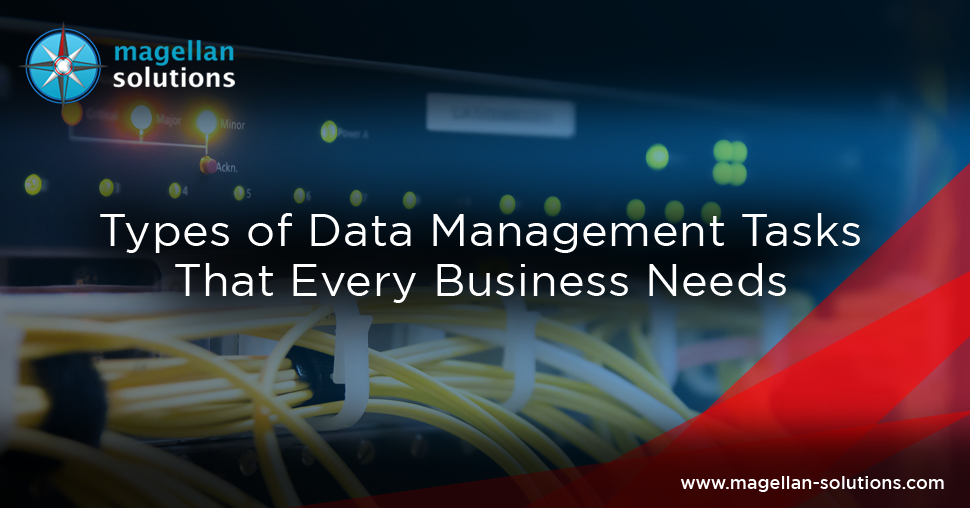Schedule a FREE call with our outsourcing expert now and get a precise quotation that meets your requirements. Don't wait - get started today!
Effective data management is essential for achieving business growth. If you manage your data poorly, your business will be vulnerable to damage, and your decisions will likely fail. However, this does not mean that you should spend all your resources to have all types of data management.
Different Types of Data Management
Data management involves several operations that are vital to implementing an exceptional data management system. However, not all businesses may have the resources to implement these all at once. In these cases, you may start with just a few types of data management tasks, such as:
- Data Mining
- Data Cleansing
- Data Entry
- Data Processing
- Data Verification
Data Mining
This is a data management process that is concerned with finding new information. The data mining process mainly involves the examination of bulks of pre-recorded information to generate data. Here, raw data or existing records are meticulously inspected to locate patterns, correlations and anomalies that can be used to predict outcomes. When websites utilize data mining to collect information, the process is called web mining.
In business, data mining is used to gain insight on business trends. Most businesses are currently generating large volumes of raw data, usually numbers or texts. The raw data is stockpiled in relational databases that often comprise several domains. You will need to regularly examine this stockpiled data to generate new and relevant information.
The information that results from data mining can help you make better business decisions. It can give you insights on trends, improve customer relations, and optimize your business model. You can also discover relationships among diverse fields and use them to maximize your gains.
Data Cleansing
Data management aims to provide accurate data so you can make the best business decisions. If your data is inaccurate, irrelevant or tarnished in any way, your decisions can damage your business. This can be prevented with an effective data cleansing practice.
Data cleansing is the process of identifying inaccurate, corrupt or “dirty” data, and correcting and removing them. This process ensures that your database remains seamless and comprehensive. Effective data cleansing allows you to manage data easily and prevent data explosion.
Data Entry
Data entry is entering or transferring information into your business database. The information involved may be in the form of words or numerical data. The process can be performed manually or automated using data entry software. With an accurate data entry process, your database contains all relevant data without omissions, duplication, and incorrect entries.
Aside from being an essential data management function, data entry is especially beneficial in small businesses. Effective data entry helps boost business growth and optimizes sales and marketing functions.
This is one of the types of data management that is considered a necessary business process. However, it can be a time-consuming task. If your in-house staff handles data entry for your business, it can consume much of your resources. For this reason, a lot of companies outsource data entry. This is a strategic and cost-effective move, especially for startups and small businesses.
Data Processing
Often, the data you initially gathered is still raw. Raw data refers to information that is not yet machine-readable or ready for business use. To “cook” the data or prepare it for utilization, raw data needs to undergo data processing.
Data processing converts collected information into usable data. Without data processing, the information you gathered will be complicated to manage. Worse, the information may be useless as a whole. Data processing and sales and marketing records are also necessary in delivering effective reports.
Data Verification
Nowadays, we are all exposed to a continuous and voluminous stream of data. Ensuring high data quality is a must for a business to stand out among its competitors.
Data verification or data validation is concerned with maintaining data quality. It is the process of checking the accuracy and integrity of the information you use in your business. During data verification, your database is checked for errors, duplication or incomplete information. Data verification will also update or confirm the data when a record seems questionable or outdated.
Data verification is also necessary in protecting customer information. It can be used to verify your customer’s identity to avoid fraudulent activities.
In-house or outsourcing?
You can have your in-house staff handle data management or outsource it to a third party. Both options have their pros and cons. So, it would be best if you chose the strategy that is better suited for your business.
In in-house data management, your staff will carry out the data management tasks for your business. You may do this by hiring employees solely to perform data management tasks. Also, you can add data management functions to the jobs of existing employees. However, in-house data management can divert employees’ collective attention away from core activities. Hiring new employees can cost a lot, as well.
Outsourcing, on the other hand, allows a third-party service provider to cover your data management tasks. Here, your data management will be handled by a dedicated team of experts from your service provider. This allows you to expand your workforce without onboarding and training expenses. Your outsourced team would know the best practices and be well-equipped to handle data management.
When comparing outsourcing with in-house hiring, it is also worth noting that outsourcing can be more cost-effective. Outsourcing improves cash flow within an organization. For startups and small businesses, outsourcing can also propel business success.
How to choose a reliable data management service provider
It is understandable if you are hesitant to follow the data management outsourcing trend. After all, outsourcing your data management requires you to entrust sensitive business information to a third-party company.
To avoid these risks, you need to select your service provider and consider the following carefully:
- Industry experience: a reliable service provider should have an extensive background in data management.
- Staff quality: their staff should be highly trained and well-equipped to handle data management services.
- Safety guarantee: check if the outsourcing company complies with the highest data handling and privacy standards. An effective way of doing this is to ensure they have ISO and HIPAA certifications.
- Value for money: choose a service provider that offers flexible rates while still upholding the highest quality of service.
A trustworthy data management outsourcing company
Magellan Solutions is a Business Process Outsourcing (BPO) company based in the Philippines. We offer high-quality data management, data mining, data cleansing, data entry, data processing, and data verification services. With over 15 years of experience in the industry, we have helped and continue to support businesses of all sizes from around the world.
Our company is ISO and HIPAA-certified, so you can rest assured that your data is safe with us. Our data management staff is composed of experts who have undergone thorough training. We also keep up with data management trends, laws, and innovations and make sure that our team utilizes these in providing our services.
Would you like to learn more about Magellan Solutions? Get in touch with us today!













